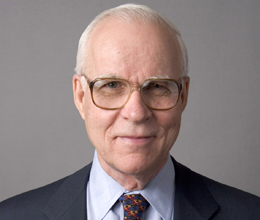 The AACR-CRI Lloyd J. Old Award in Cancer Immunology recognizes an active scientist whose outstanding and innovative research has had a major impact on the cancer field and has the potential to stimulate new directions in cancer immunology.
The AACR-CRI Lloyd J. Old Award in Cancer Immunology recognizes an active scientist whose outstanding and innovative research has had a major impact on the cancer field and has the potential to stimulate new directions in cancer immunology.
The award is named in honor of Dr. Lloyd J. Old (1933–2011), who was the founding scientific and medical director of the Cancer Research Institute (CRI) and was elected as an honorary member of the American Association for Cancer Research (AACR) in 1995. He is recognized as the founder of modern tumor immunology and the standard-bearer in the field of cancer immunotherapy. With steadfast vision and leadership, the late Dr. Old shepherded basic discovery in tumor immunity from the bench and animal models into clinical research, with the goal of discovering immune-based solutions to cancer.
The Award recipient will receive an honorarium and present an award lecture during the AACR Annual Meeting.
Access nomination process details and eligibility criteria
2022
Ira Mellman, Ph.D.
Dr. Mellman is honored for a variety of contributions in both basic and clinical research, in particular his discoveries regarding dendritic cell biology, his advances in the realm of PD-L1 checkpoint immunotherapy and biomarkers, and his conception of the cancer-immunity cycle.
2021
Ton N. Schumacher, Ph.D.
Dr. Schumacher is honored for his many contributions that have addressed a fundamental question in immunology: how do T cells “see” other cells and determine whether they are normal or not? His discoveries—and the technologies he has created to make those discoveries—have had far reaching implications. Overall, his career contributions have refined our understanding of T cell recognition of cancer cells and enabled us to dissect these interactions more deeply, contributing to our efforts to treat cancer in humans.
2020
Steven A. Rosenberg, M.D., Ph.D.
Dr. Rosenberg is honored for his seminal discoveries that led to the first effective cancer immunotherapy, interleukin-2 (IL-2), and the first adoptive cell transfer immunotherapies for both solid and blood cancers, including genetically modified T cells.
2019
Cornelis J.M. Melief, M.D., Ph.D.
Dr. Melief is honored for his discovery of mechanisms of immune recognition of cancer antigens and activation of antitumor responses, and for his role in the development of innovative immunotherapies, including a vaccine against the human papillomavirus (HPV), a leading cause of cervical cancer. He currently focuses on developing new immunotherapies and improving their effectiveness through combination therapies.
2018
Antoni Ribas, M.D., Ph.D.
Dr. Ribas is honored for groundbreaking contributions to the successful development of checkpoint inhibitor immunotherapy for patients with metastatic melanoma, which have dramatically changed the treatment options for patients with melanoma and many other cancers. As a recognized leader in clinical trials with anti-PD1 antibodies, Dr. Ribas led the clinical development of pembrolizumab, which was the first anti-PD1 approved by the FDA for any cancer. He has defined mechanisms that lead to response and acquired resistance to PD-1 blockade therapies. His impressive body of work has earned him the reputation as a true pioneer in the field.
2017
Olivera J. Finn, Ph.D.
Dr. Finn is honored for her identification of the first tumor-associated T cell target on human adenocarcinomas, epithelial mucin MUC1. She is credited for the discovery of anti-MUC1 antibodies in cancers of the breast, pancreas, and colon, thereby demonstrating spontaneous immunity against a developing tumor. Dr. Finn and her team also identified non-mutated cyclin B1 as a tumor antigen and published several papers on its excellent potential as a cancer vaccine. She was the first in 1993 to test in clinical trials a therapeutic cancer vaccine based on a non-mutated human tumor antigen and the first again in 2008 to test the same vaccine in a preventive setting. These studies are considered fundamental to the field of cancer vaccination, laying the groundwork for a new paradigm of immunomodulation, immunosurveillance, and cancer prevention.
2016
Ronald Levy, M.D.
Dr. Levy is honored for important contributions to cancer immunology, specifically for pioneering the use of antibodies, such as rituximab, for cancer treatment. His work has been integral to the dramatic progress in tumor immunotherapy over the past three decades, revealing the potential for not only monoclonal antibody therapy, but also tumor vaccination and immune costimulation to generate antitumor immune responses.
2015
Carl H. June, M.D.
Dr. June is honored for his pioneering efforts related to the development of chimeric antigen receptor (CAR) T-cell therapy. His work with CAR T-cell therapy has significantly enhanced the promise of cancer immunotherapy. For example, a CD19-targeted CAR T cell therapy developed by June and his team was recently licensed by Novartis, and the investigational therapy, now called CTL019, has received breakthrough therapy designation from the U.S. Food and Drug Administration for the treatment of relapsed and refractory adult and pediatric acute lymphoblastic leukemia (ALL). This work will not only have a profound impact on the treatment of leukemia but is paving the way for the development of CAR T therapies for other types of cancer.
2014
Robert D. Schreiber, Ph.D.
Dr. Schreiber is honored for his pioneering contributions to the field of cancer immunology, which have helped establish a clearer understanding of the immune system’s role in tumor progression. His important discoveries include the identification of IFNγ as a key cytokine in antitumor immunity and the development of the cancer immunoediting concept, which integrates the host protective and tumor promoting functions of the immune system and provides a framework for the design of cancer immunotherapies.
2013
James P. Allison, Ph.D.
Dr. Allison has contributed to much of our understanding of the mechanisms regulating the immunological responses mediated by the T cells. He laid the foundation for the human body's ability to manipulate the T cell system for therapeutic applications against cancers.